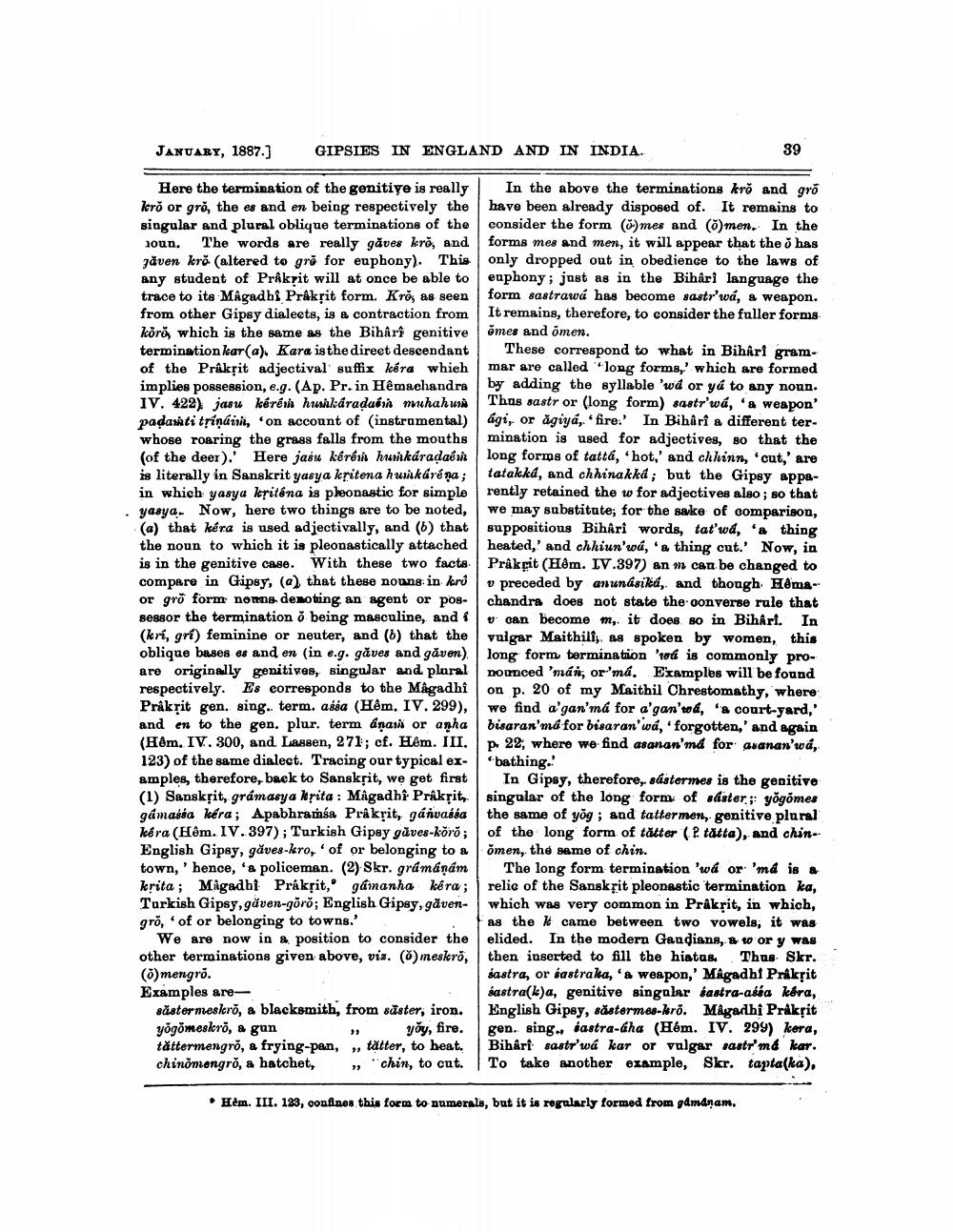________________
JANUARY, 1887.)
GIPSIES IN ENGLAND AND IN INDIA
39
Here the termination of the genitive is really In the above the terminations krõ and gro kero or gro, the es and en being respectively the have been already disposed of. It remains to singular and plural oblique terminations of the consider the form (o)mes and (o)men. In the noun. The words are really găves krõ, and forms mes and men, it will appear that the o has gäven kră (altered to gră for euphony). This only dropped out in obedience to the laws of any student of Prakrit will at once be able to euphony; just as in the Bihari language the trace to its Magadhi Prâksit form. Krēs as seen form sastrawá has become sastr'wá, a weapon. from other Gipsy dialects, is a contraction from It remains, therefore, to consider the fuller forms. körõ, which is the same as the Bihari genitive omes and omen. termination kar(a). Kara is the direct descendant These correspond to what in Bihari gramof the Prakrit adjectival suffix kéra which mar are called 'long forms,' which are formed implies possession, e.g. (Ap. Pr. in Hêmachandra by adding the syllable 'wd or yá to any noun. IV. 422) jasu kéréni hurikáradaki m ahus Thus sastr or (long form) sastr'wa, 'a weapon' padashti triņáir, on account of instrumental) ági, or ăgiya, 'fire.' In Bihari a different terwhose roaring the grass falls from the mouths mination is used for adjectives, so that the (of the deer).' Here jasu kéréni hunkáradalmi long forms of tattá, 'hot,' and chhinn, .cut,' are is literally in Sanskrit yasya kritena hukarena;
Leritena huikáréna : | tatakka, and chhinakki; but the Gipsy appain which yasya keşitána is pleonastic for simple rently retained the w for adjectives also; so that yasya. Now, here two things are to be noted, we may substitute; for the sake of comparison, (a) that kéra is used adjectivally, and (b) that suppositious Bihari words, tat'wd, 'a thing the noun to which it is pleonastically attached heated,' and chhiun'wá, a thing cut. Now, in is in the genitive case. With these two facts Pråkpit (Hêm. IV.397) an m can be changed to compare in Gipsy, (a) that these nouns in krů v preceded by anunásikd, and though Hêmeor gro form noms denoting an agent or pos- chandra does not state the converse rule that Bessor the termination o being masculine, and i can become m, it does so in Bihári. In (kri, grí) feminine or neuter, and (b) that the vulgar Maithilfs, as spoken by women, this oblique bases es and en (in e.g. găves and găven) long form termination 'wok is commonly proare originally genitives, singular and plural nomced 'mán, or 'ma. Examples will be found respectively. Es corresponds to the Magadhi on p. 20 of my Maithil Chrestomathy, where Prakrit gen. sing. term. asia (Hêm. IV. 299), we find a'gan'má for a'gan'wd, 'a court-yard,' and en to the gen. plur. term dņai or anha bisaran'ma for bisaran'wa, forgotten,' and again (Hêm. IV. 300, and Lassen, 271; cf. Hêm. III. p. 22, where we find asanan'md for asanan'wa, 123) of the same dialect. Tracing our typical ex- bathing. amples, therefore, back to Sanskrit, we get first | In Gipsy, therefore, sástermes is the genitive (1) Sanskrit, grámasya krita : Magadhi Prakrit, singular of the long form of sáster; yõgõmes gámassa kéra; Apabhramsa Prakrit, gánvassa the same of yog; and tatter men, genitive plural kéra (Hôm. IV. 397); Turkish Gipsy gèves-kõro; of the long form of tătter (2 tatta), and chin. English Gipsy, gåves-kro,' of or belonging to a omen, the same of chin. town,' hence, 'a policeman. (2) Skr. gramánám The long form termination 'wá or 'md is a krita; Mågadhi Prakrit, gámanha kera; relic of the Sanskrit pleonastic termination ka. Turkish Gipsy, gaven-goro; English Gipsy, gaven- which was very common in Prakrit, in which, grõ, of or belonging to towns.'
as the X came between two vowels, it was We are now in a position to consider the elided. In the modern Gandiang, & w or y was other terminations given above, vis. (o) meskero, then inserted to fill the hiatas. Thus Skr. (ö)mengro.
sastra, or sastraka, 'a weapon,' Magadhi Prakrit Examples are
sastra(le)a, genitive singular sastra-asra kéra, sästermeskrõ, a blacksmith, from sūster, iron. English Gipsy, săstermes-kro. Magarbi Praksit yogõmeskrő, a gun
yoy, fire. gen. sing. lastra-kha (Hém. IV. 299) kera, tăttermengrõ, a frying-pan,,, tatter, to heat. Bihari sastr'wá kar or vulgar sastrmd kar. chinonongrõ, a hatchet, „ "chin, to cut. To take another example, Skr. tapta(ka),
• Hem. III. 123, oonfines this form to numerals, but it is regularly formed from ydmanam.




